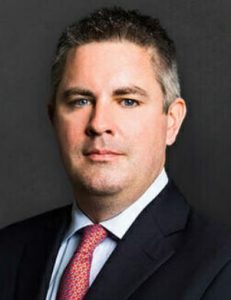Adam Cloherty KC – XXIV Old Buildings, London

Adam Cloherty KC, who joined the ranks of silk in 2023, has a broad commercial chancery practice acting in and advising on commercial and private wealth disputes both domestically and internationally. Adam’s cases span this commercial set’s main fields of practice, and draw on his knowledge of equitable, trust and corporate principles.
Adam comes from a working-class background, growing up in West London and attending a local comprehensive school where he had the great good fortune to encounter “very dedicated, supportive, amazing teachers”. They recognised and nurtured Adam’s sharp academic ability and encouraged him to aim for Oxbridge or some other Russell Group university. Adam had no family or other connections with the law. In his own words, “I was a chippy lad!” and the cut and thrust of advocacy really appealed to him.
In the upper 6th form, Adam took part in the Bar Council mock trial competition, where he and a school friend had the role of the advocates in the case and were allocated a practising barrister as a mentor. Competing against schools across the whole of the UK including some top public schools, Adam and his friend came second nationally. Without his inspirational and supportive teachers, Adam says, he would not be where he is today – “they changed everything”. Some of these very experienced teachers were at the end of their careers and Adam considers that he was extremely lucky to have been in the right place at the right time to benefit from their wisdom and encouragement. He took his M.A. Law at St John’s College, Cambridge where he was a McMahon Scholar. One of his university tutors was qualified as a barrister and opened Adam’s eyes to a career at the Bar.
During his university studies, Adam had initially thought that he would work in public, administrative and constitutional law, but the more that he studied the type of law he now did for a living, he came to greatly enjoy the complexities and challenges of company law, contracts and equity.
Adam’s first job on graduation was as a research assistant at the (then) DTI, an opportunity that came up during his final year at Cambridge, and which was too good to pass over as a means to raise some money towards the early years of advocacy training. Adam found the experience extremely valuable as he found himself working as part of a team drafting the Parliamentary Bill that would become the Companies Act 2006 – and which, of course, is now so central to so much of his work as a Chancery barrister.
Adam obtained a pupillage and a scholarship (as Astbury Scholar, Middle Temple) to fund Bar school, without which it would have been extremely difficult (at least without recourse to a large student loan). Even with the “game changing” scholarship, Adam still had to find funds for his living costs. He recognises that he was extremely fortunate that his chambers were able to fund a generous pupillage award that enabled prospective pupils to draw down a large chunk of those costs in advance. Adam said that the costs of embarking on a career in advocacy remained a serious barrier to those from low-income backgrounds, particularly for those who aspired to work in those areas of public law funded from the public purse.
Adam said he owed a huge debt of gratitude to the eminent colleagues he has had the opportunity to work for and alongside in his “medium sized” chambers (of around 45 barristers) “where everyone more or less knows everyone else”. He was able to observe “superstar silks” very closely whilst also working on his own smaller cases as a junior. These mentors provided Adam with invaluable hints and tips and “brought you into things” and “introduced you to people”. Adam did a number of incredibly interesting cases as his career developed, increasingly finding himself as senior-junior effectively running some cases, bringing in a leader at later stages.
One “flip side” of working with such inspiring people was that it seemed hard for Adam to imagine ever emulating them and achieving the accolade of silk. It took him a while for “the penny to drop” and realise that many of his mentors had been in silk for perhaps fifteen or twenty years or more. It took time and experience to get that good.
As his career progressed, Adam found himself leading cases as a senior junior, and some “incredibly supportive” colleagues were increasingly suggesting that he should seriously consider applying for silk himself. It was that encouragement that gave Adam the confidence to apply for KC and “overcome my excuses!”
Being so busy as a senior junior, it was very difficult to carve out the necessary time for the KC application form. But “when the deadline approached, I just had to get on with it.” Adam felt rather nervous that he had forgone external professional support with the application form – which he suspected many applicants sought, even if they kept quiet about it.
However, his anxiety lessened as he read through the material available on the KCA website. Having been more than a little sceptical, Adam found that this contained all the documentation and guidance that he needed for the application form and to ready him for the interview (if applicable). The detailed description and explanations of what the Panel sought in terms of the competencies, Adam found particularly helpful. The guidance was accessible, comprehensive, and helpful but without being too voluminous. As a lawyer you were in any case well versed in matching evidence/facts to specific tests/requirements, and in that respect the application process for silk was no different. There was nothing which he might have needed to succeed that was not on the KCA website.
Adam said his experience was that the Panel simply wanted you to give of your best so that all those who met the very high bar for silk by demonstrating the necessary evidence of excellence across the competencies – in the application form, assessments and interview – could succeed. Adam did get some help with the interview as he was not experienced in competency-based interviews, that is, “sitting on that side of the table” as opposed to interviewing prospective pupils for chambers. Also, a good friend from university days who worked in the senior civil service – not herself a lawyer – helped Adam prepare for the interview, providing challenge and insights and familiarity with the somewhat alien experience of advocating for himself rather than on behalf of his clients.
At interview, Adam felt more at home talking about the legal competencies (“about the day job, my cases and the law”) than about the non-legal competencies, Competency C – Working with others, and Competency D – Diversity Action and Understanding. Most barristers, suspected Adam, do not sit down and separately reflect on those aspects of the work, how you lead a team for example, “the stuff you do reflexively”. But you do have to think closely about those competencies for the competition – about what you believe, understand and, primarily, what you do. Adam’s Uni friend encouraged him to recall difficult situations and what he had done and how he had made a difference; “what you did and why it worked”. The KC application process makes you more reflective, said Adam.
He experienced some interview nerves, “as there was a lot riding on it”. It was a “bit strange and unfamiliar.” However, all-in-all, Adam found it a very positive experience. He tells other people thinking about applying for silk that the interview is exactly as it is described in the online KCA guidance. It was “refreshingly business-like, and even enjoyable” with the two Panel members clearly sign-posting the format of the interview and questions. There was no sense of being under attack or any suggestion of trips or tricks. It was your opportunity to give of your best.
Adam was “a bit of a grinch”, he said, when it came to the pomp and dressing up of the profession, but he did admit to really enjoying the KC ceremony, as much for his nearest and dearest as anything else. He was amused that the family were far more impressed by the Royal Courts of Justice (for that part of the day) than they were by seeing the Rolls Buildings where Adam actually earns his living!
- Date: August 21, 2024
- Category:

